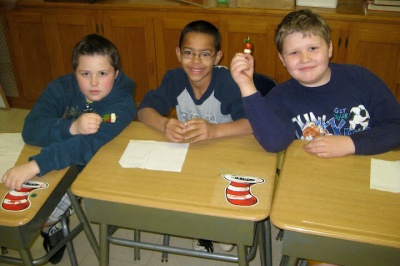Salad on a Stick?
Posted: May 21, 2012
Fifth grade students at MFL MarMac's McGregor center earned the title of school champions for recording their data in the Live Healthy Iowa 100 Day Wellness Challenge. An interest in gardening and vegetables contributed to their success.
Jennelle Schroeder, the school nurse, and Sonja Arneson-Ecklund, the FFI Resource Contact, worked together to come up with an activity for the kids that reflected their interest in learning more about vegetables. Sonja brought local cherry tomatoes, local basil, and local mozzarella goat cheese to the classrooms during health. She taught students about a unique snack. Classroom helpers passed out toothpicks. Students speared a piece of cheese, a tomato, and a leaf of basil to make a Caprese salad on a stick. Most students had never eaten a salad on a stick.
As one student said, "I've always eaten salad off a plate…So this is like eating an adventure salad!" The students tasted their snack simultaneously, and one even went so far as to report that the flavors combined in "the most delicious way I've ever tasted in my life!"
Caprese salad is a Mediterranean appetizer and is often served on a plate like a normal salad. Sonja learned about the salad when she lived in the Mediterranean, but she explained that a unique feature of the salad is it can be made from all local ingredients.
The rest of the lesson involved planting a windowsill garden. Classroom helpers passed out biodegradable planting cups, sharpies, potting soil, and seeds. The students made the tough decision between planting basil seeds or tomato seeds. A student who decided he wasn't fond of basil or tomatoes thought of a creative way to still enjoy the classroom activity. "I'm going to hide my seeds at my friend's house until it grows into a plant, and then I'm going to give it to my mom for mother's day," he explained.
Northeast Iowa Food & Fitness Initiative's is working to create places where people have access to healthy, locally grown foods. When students plant seeds and watch the growing process, they make connections between where food comes from, how food grows, and how we choose to eat it. And the education that happens gardening is profound—something as simple as dirt, water, and sunlight can becomes the most fascinating part of the school day.


